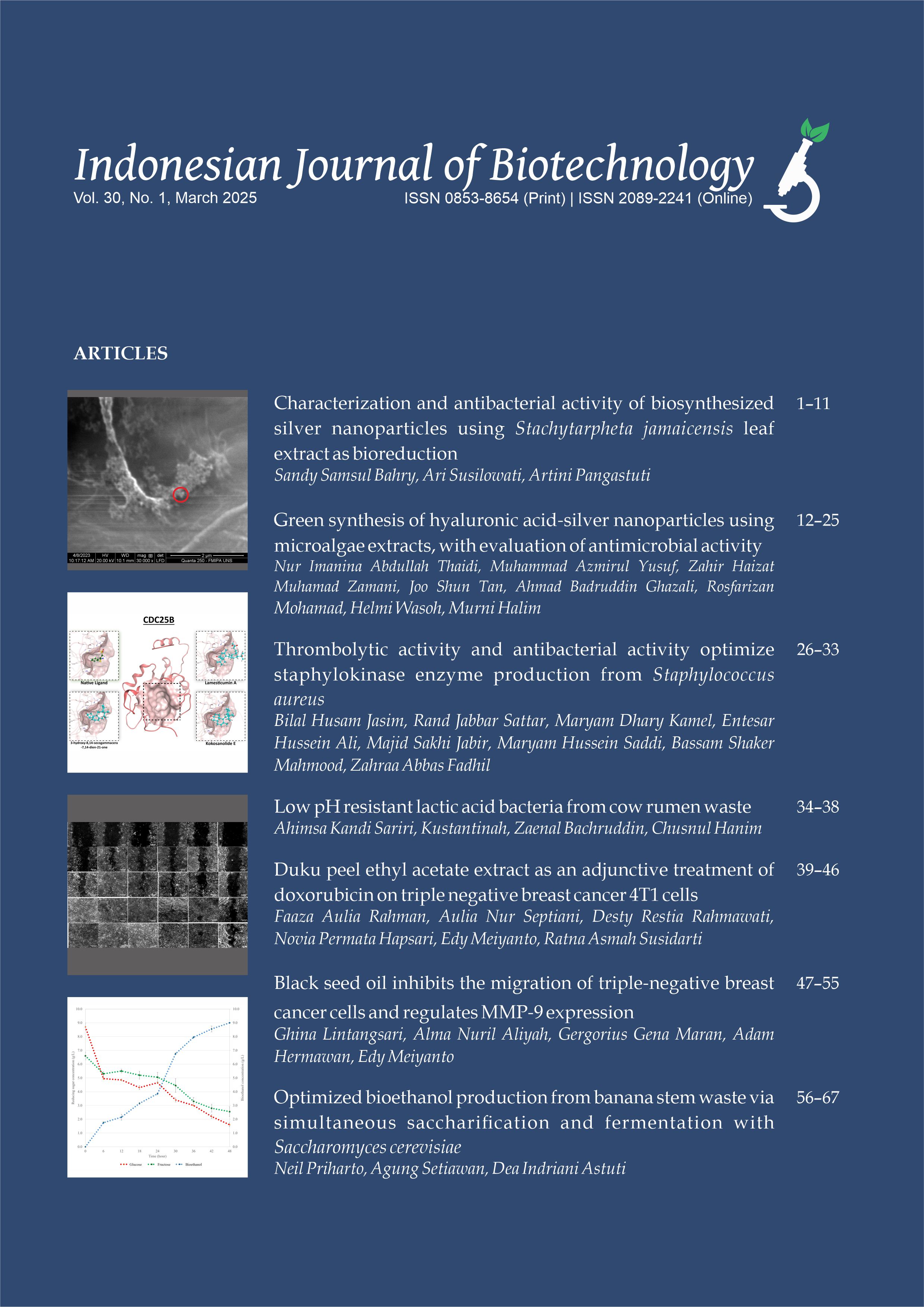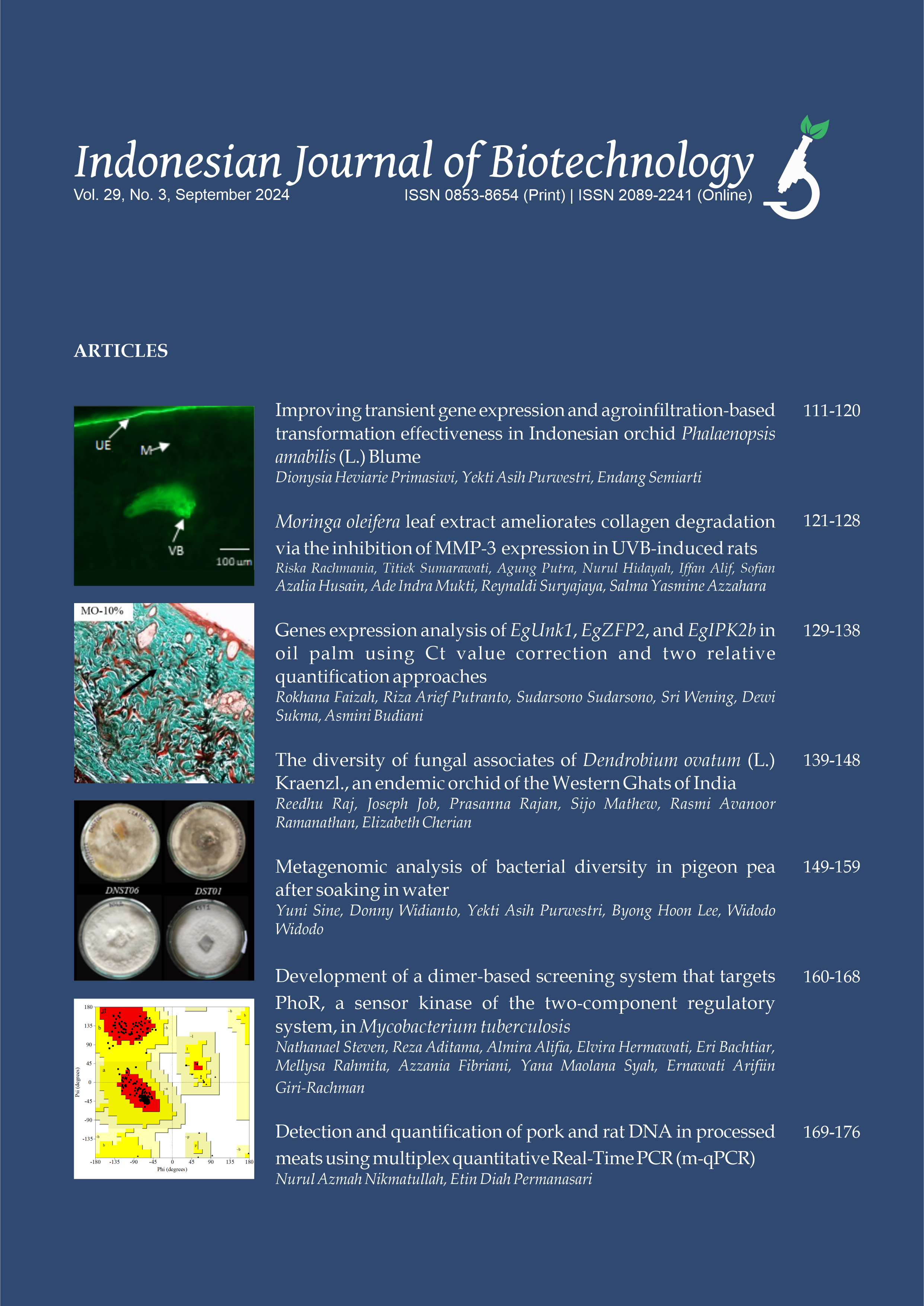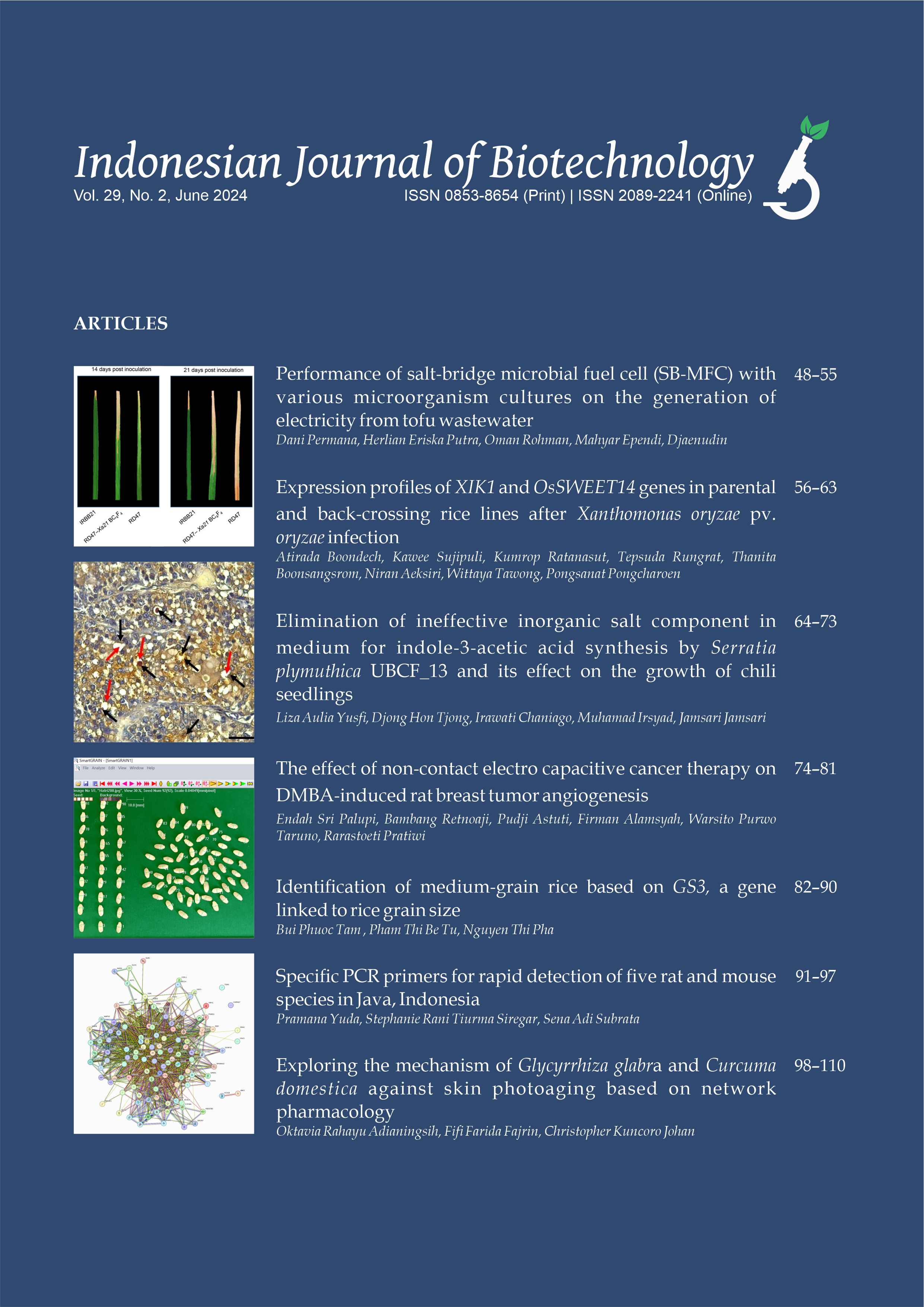Network pharmacology of black cumin (Nigella sativa L.) as a candidate of OMAI in colorectal cancer: in silico study
Firzannida Firzannida(1), Sakti Bagaskara(2), Savana Sonia Savira(3), Aufa Fadnurrahim(4), Siti Rofida(5*)
(1) Pharmacy Undergraduate Student, Faculty of Health Science, University of Muhammadiyah Malang, East Java 65145, Indonesia
(2) Pharmacy Undergraduate Student, Faculty of Health Science, University of Muhammadiyah Malang, East Java 65145, Indonesia
(3) Pharmacy Undergraduate Student, Faculty of Health Science, University of Muhammadiyah Malang, East Java 65145, Indonesia
(4) Pharmacy Undergraduate Student, Faculty of Health Science, University of Muhammadiyah Malang, East Java 65145, Indonesia
(5) Pharmacy Department, Faculty of Health Science, University of Muhammadiyah Malang, East Java 65145, Indonesia
(*) Corresponding Author
Abstract
Keywords
Full Text:
PDFReferences
Altman T, Travers M, Kothari A, Caspi R, Karp PD. 2013. A systematic comparison of the MetaCyc and KEGG pathway databases. BMC Bioinformatics 14(112):1– 15. doi:10.1186/1471210514112.
Barata JT, Oliveira ML. 2019. Cell Signaling in Cancer. In: R Fior, R Zilhão, editors, Molecular and Cell Biology of Cancer: When Cells Break the Rules and Hijack Their Own Planet, chapter 3. Switzerland: Springer Nature Switzerland AG, 1 edition. p. 31–43. doi:10.1007/9783030118129_3.
Carneiro BA, ElDeiry WS. 2020. Targeting apoptosis in cancer therapy. Nat. Rev. Clin. Oncol. 17:395–417. doi:10.1038/s415710200341y.
Carrillo C, Cavia MDM, AlonsoTorre SR. 2012. Antitumor effect of oleic acid; mechanisms of action: a review. Nutr. Hosp. 27(5):1860–1865. doi:10.3305/nh.2012.27.6.6010.
Chen M, Lee N, Hsu H, Ho T, Tu C, Chen R, YuehMin Lin Y, Viswanadha V, Kuo W, Huang C. 2017. Inhibition of NFB and metastasis in irinotecan (CPT11) resistant LoVo colon cancer cells by thymoquinone via JNK and p38. Environ. Toxicol. 32(2):669–678. doi:10.1002/tox.22268.
Corso M, Perreau F, Mouille G, Lepiniec L. 2020. Specialized phenolic compounds in seeds: structures, functions, and regulations. Plant Sci. 296(110471):1–15. doi:10.1016/j.plantsci.2020.110471.
Daina A, Michielin O, Zoete V. 2019. SwissTargetPrediction: updated data and new features for efficient prediction of protein targets of small molecules. Nucleic Acids Res. 47(W1):W357–W364. doi:10.1093/nar/gkz382.
Dirican A, Atmaca H, Bozkurt E, Erten C, Karaca B, Uslu R. 2015. Novel combination of docetaxel and thymoquinone induces synergistic cytotoxicity and apoptosis in DU145 human prostate cancer cells by modulating PI3KAKT pathway. Clin. Transl. Oncol. 17(2):145–151. doi:10.1007/s1209401412066.
Doncheva NT, Morris JH, Gorodkin J, Jensen LJ. 2019. Cytoscape StringApp: Network analysis and visualization of proteomics data. J. Proteome Res. 18(2):623–632. doi:10.1021/acs.jproteome.8b00702.
ElBaba C, Mahadevan V, Fahlbusch F, Mohan S, Rau T, GaliMuhtasib H, SchneiderStock R. 2014. Thymoquinoneinduced conformational changes of PAK1 interrupt prosurvival MEKERK signaling in colorectal cancer. Mol. Cancer 13:201. doi:10.1186/1476459813201.
Filimonov DA, Lagunin AA, Gloriozova TA, Rudik AV, Druzhilovskii DS, Pogodin PV, Poroikov VV. 2014. Prediction of the biological activity spectra of organic compounds using the pass online web resource. Chem. Heterocycl. Compounds 50(3):444– 457. doi:10.1007/s1059301414961.
FlorescuŢenea RM, Kamal AM, Mitruţ P, Mitruţ R, Ilie DS, Nicolaescu AC, Mogoantă L. 2019. Colorectal Cancer: An update on treatment options and future perspectives. Curr. Health Sci. J. 45(2):134–141. doi:10.12865/CHSJ.45.02.02.
Gfeller D, Grosdidier A, Wirth M, Daina A, Michielin O, Zoete V. 2014. SwissTargetPrediction: a web server for target prediction of bioactive small molecules. Nucleic Acids Res. 42(W1):W32–W38. doi:10.1093/nar/gku293.
Guney E, Menche J, Vidal M, Barábasi A. 2016. Networkbased in silico drug efficacy screening. Nat. Commun. 7(1):1–13. doi:10.1038/ncomms10331.
Guo Y, Pan W, Liu S, Shen Z, Xu Y, Hu L. 2020. ERK/MAPK signalling pathway and tumorigenesis. Exp. Ther. Med. 19(3):1997–2007. doi:10.3892/etm.2020.8454.
Hao Y, Baker D, Ten Dijke P. 2019. TGFβ mediated epithelialmesenchymal transition and cancer metastasis. Int. J. Mol. Sci. 20(11):1–34. doi:10.3390/ijms20112767.
Hosseinzadeh H, Mollazadeh H, Afshari A. 2017. Review on the potential therapeutic roles of Nigella sativa in the treatment of patients with cancer: Involvement of apoptosis. J. Pharmacopuncture 20(3):158–172. doi:10.3831/kpi.2017.20.019.
Hsu H, Chen M, Day C, Lin Y, Li S, Tu C, Padma V Shih H, Kuo W, Huang C. 2017. Thymoquinone suppresses migration of LoVo human colon cancer cells by reducing prostaglandin E2 induced COX2 activation. World J. Gastroenterol. 23(7):71171–71179. doi:10.3748/wjg.v23.i7.1171.
Idrus R, Nordin A, Kamal H, Yazid M, Saim A. 2019. Effect of Nigella sativa and its bioactive compound on type 2 epithelial to mesenchymal transition: a systematic review. BMC Complementary Altern. Med. 19(290):1–12. doi:10.1186/s1290601920762.
Islam M, Khalipha A, Bagchi R, Mondal M, Smrity S, Uddin S, Shilpi J, Rouf R. 2019. Anticancer activity of Thymol: A literaturebased review and docking study with Emphasis on its anticancer mechanisms. IUBMB Life 71(1):9–19. doi:10.1002/iub.1935.
Juan C, Agahi F, Font G, JuanGarcia A. 2020. In silico methods for metabolomics and toxicity prediction of zearalenone, αzearalenone, and βzearalenone. Food Chem. Toxicol. 146:1–10. doi:10.1016/j.fct.2020.111818.
Jung B, Staudacher J, Beauchamp D. 2017. Transforming Growth Factor beta Superfamily Signaling in Development of Colorectal Cancer. Gastroenterology 152(1):36–52. doi:10.1053/j.gastro.2016.10.015.
Khan MA, Tania M, Fu S, Fu J. 2017. Thymoquinone, as an anticancer molecule: from basic research to clinical investigation. Oncotarget 8(31):51907–51919. doi:10.18632/oncotarget.17206.
Kononenko O, Baysal O, Holmes R, Godfrey MW. 2014. Mining modern repositories with elasticsearch. In: Proceedings of the 11th Working Conference on Mining Software Repositories, MSR 2014. New York, NY, USA: Association for Computing Machinery. p. 328–331. doi:10.1145/2597073.2597091.
Kooti W, HasanzadehNoohi Z, SharafiAhvazi N, AsadiSamani M, AshtaryLarky D. 2016. Phytochemistry, pharmacology, and therapeutic uses of black seed (Nigella sativa). Chin. J. Nat. Med. 14(10):732–745. doi:10.1016/s18755364(16)300887.
Koveitypour Z, Panahi F, Vakilian M, Peymani M, Forootan F, Esfahani M, Ghaedi K. 2019. Signaling pathways involved in colorectal cancer progression. Cell Biosci. 9:1–14. doi:10.1186/s135780190361 4.
Li M, Li D, Tang Y, Wu F, Wang J. 2017. CytoCluster: A cytoscape plugin for cluster analysis and visualization of biological networks. Int. J. Mol. Sci. 18(9):1–13. doi:10.3390/ijms18091880.
Ministry of Health of the Republic of Indonesia. 2018. Pedoman Nasional Pelayanan Kedokteran Tata Laksana Kanker Kolorektal. Kementerian Kesehatan Republik Indonesia.
National Agency of Drug and Food Control of the Republic of Indonesia. 2020. Informatorium Obat Modern Asli Indonesia (OMAI) di Masa Pandemi COVID19. Jakarta: National Agency of Drug and Food Control of the Republic of Indonesia.
Okita A, Takahashi S, Ouchi K, Inoue M, Watanabe M, Endo M, Honda H, Yamada Y, Ishioka C. 2018. Consensus molecular subtypes classification of colorectal cancer as a predictive factor for chemotherapeutic efficacy against metastatic colorectal cancer. Oncotarget 9(27):18698–18711. doi:10.18632/oncotarget.24617.
RecioBoiles A, Cagir B. 2021. Colon Cancer. StatPearls Publishing. URL https://www.ncbi.nlm.nih.gov/boo ks/NBK470380/. Salim L, Mohan S, Othman R, Abdelwahab S, Kamalidehghan B, Sheikh B, Ibrahim M. 2013. Thymoquinone induces mitochondriamediated apoptosis in acute lymphoblastic leukaemia in vitro. Molecules 18(9):11219–11240. doi:10.3390/molecules180911219.
Santarpia L, Lippman SM, ElNaggar AK. 2012. Targeting the MAPK–RAS–RAF signaling pathway in cancer therapy. Expert Opin. Ther. Targets 16(1):103– 119. doi:10.1517/14728222.2011.645805.
Savithramma N, Yugandhar P, Prasad KS, Ankanna S, Chetty KM. 2016. Ethnomedicinal studies on plants used by Yanadi tribe of Chandragiri reserve forest area, Chittoor District, Andhra Pradesh, India. J. Intercult. Ethnopharmacol. 5(1):49–56. doi:10.5455/jice.20160122065531.
Singer S. 2018. Psychosocial impact of cancer. Recent Results Cancer Res. 210(210):1–11. doi:10.1007/9783 319643106_1.
Slattery M, Mullany L, Sakoda L, Wolff R, Stevens J, Samowitz W, Herrick J. 2018. The PI3K/AKT signaling pathway: Associations of miRNAs with dysregulated gene expression in colorectal cancer. Mol. Carcinog. 57(2):243–261. doi:10.1002/mc.22752.
Sutiono R, Salim MMGR, Nadya, Liani O, Susanto S. 2017. Native Indonesian Herbs: Challenges in The Future for AntiCancer Drugs. Cermin Dunia Kedokteran 44(11):822–826. doi:http://dx.doi.org/10.55175/cdk.v44i11.708.
Sveen A, Bruun J, Eide P, Eilertsen I, Ramirez L, Murumägi A, Arjama M, Danielsen S, Kryeziu K, Elez E, Tabernero J, Guinney J, Palmer H, Nesbakken A, Kallioniemi O, Dienstmann R, RA L. 2018. Colorectal cancer consensus molecular subtypes translated to preclinical models uncover potentially targetable cancer cell dependencies. Clin. Cancer Res. 24(4):794– 806. doi:10.1158/10780432.CCR171234.
Syahrir NHA, Afendi FM, Susetyo B. 2016. Efek sinergis bahan aktif tanaman obat berbasiskan jejaring dengan protein target. Jurnal Jamu Indonesia 1(1):35–46. URL http://biofarmaka.ipb.ac.id/biofarmaka/2017/Ju rnal%20Jamu%20Indonesia%20Vol%201%20No% 201%20Artikel%205.pdf.
Szklarczyk D, Gable AL, Lyon D, Junge A, Wyder S, HuertaCepas J, Simonovic M, Doncheva NT, Morris JH, Bork P, Jensen LJ, Mering Cv. 2019. STRING v11: protein–protein association networks with increased coverage, supporting functional discovery in genomewide experimental datasets. Nucleic Acids Res. 47(D1):D607–D613. doi:10.1093/nar/gky1131. URL https://doi.org/10.1093/nar/gky1131.
Szklarczyk D, Santos A, von Mering C, Jensen LJ, Bork P, Kuhn M. 2016. STITCH 5: augmenting proteinchemical interaction networks with tissue and affinity data. Nucleic Acids Res. 44(D1):D380–4. doi:10.1093/nar/gkv1277.
TejedaMuñoz N, RoblesFlores M. 2015. Glycogen synthase kinase 3 in Wnt signaling pathway and cancer. IUBMB Life 67(12):914–922. doi:10.1002/iub.1454.
Vogelstein B, Papadopoulos N, Velculescu V, Zhou S, Diaz, LA J, Kinzler K. 2013. Cancer genome landscapes. Science 339(6127):1546–1558. doi:10.1126/science.1235122.
Woo C, Hsu A, Kumar A, Sethi G, Tan K. 2013. Thymoquinone inhibits tumor growth and induces apoptosis in a breast cancer xenograft mouse model: the role of p38 MAPK and ROS. PLoS One 8(10):e75356. doi:10.1371/journal.pone.0075356.
Yi F, Liu H, Li L, Xu L, Meng H, Dong Y, Xiao P. 2018. In silico approach in reveal traditional medicine plants pharmacological material basis. Chinese Med. CHIN MEDUK 13(1):1–20. doi:10.1186/s13020 01801900.
Article Metrics
Refbacks
- There are currently no refbacks.
Copyright (c) 2022 The Author(s)

This work is licensed under a Creative Commons Attribution-ShareAlike 4.0 International License.









